It breaks my heart to be reminded of how cruel humans can be toward their canines who deserve infinite love and a lifetime of happiness.
Just like all dogs, Crumb had every right to be happy and loved, but sadly, his owners dumped him on the streets when he needed them the most.
The pup’s family abandoned Crumb after he got sick without feeling the slightest bit of empathy toward him.
All alone, Crumb struggled to survive while his mange became worse. People didn’t want to help him, and they chased him away because of his sickness.
The little canine lost faith in humans, and he became terrified of them. Crumb believed that all humans were cruel and he did his best to avoid them.
Kind Rescuers Give Him Hope
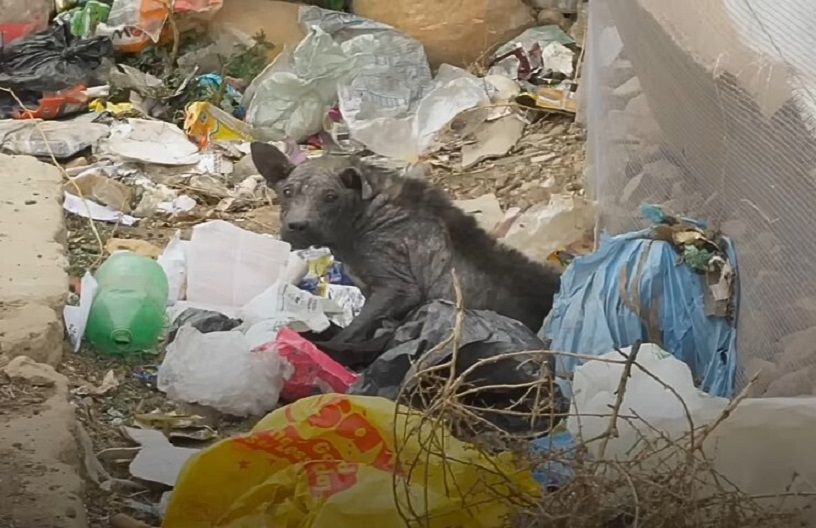
When Rachael and her rescue team at Sidewalk Specials heard about the abandoned dog named Crumb, who lived a miserable life as a stray, they tried to rescue him.
Since Crumb was scared of humans, he refused to trust the rescuers.
They kept trying to capture him for eight months, but Crumb bolted out of fear every time they approached.
One day, a Good Samaritan called the rescuers, informing them that a mangy pup needed urgent help.
When Rachael and her team arrived at the location, they saw a familiar face looking for food in the trash. It was Crumb.
Rachael desperately wanted to catch him, and she asked volunteers to help her.
As soon as Crumb saw the rescuers, he started running.
One of the volunteers managed to get close to Crumb and place a plastic bottle on him. Rachael held Crumb while the other rescuer was trying to put a leash over his neck.
Crumb was frightened, and he tried to bite his rescuer. He was in his defense mode.
The rescuers kept talking to him and telling him that he was safe.
One of the rescuers caressed his head, and at that moment, Crumb stopped defending himself.
Crumb Is Finally Safe
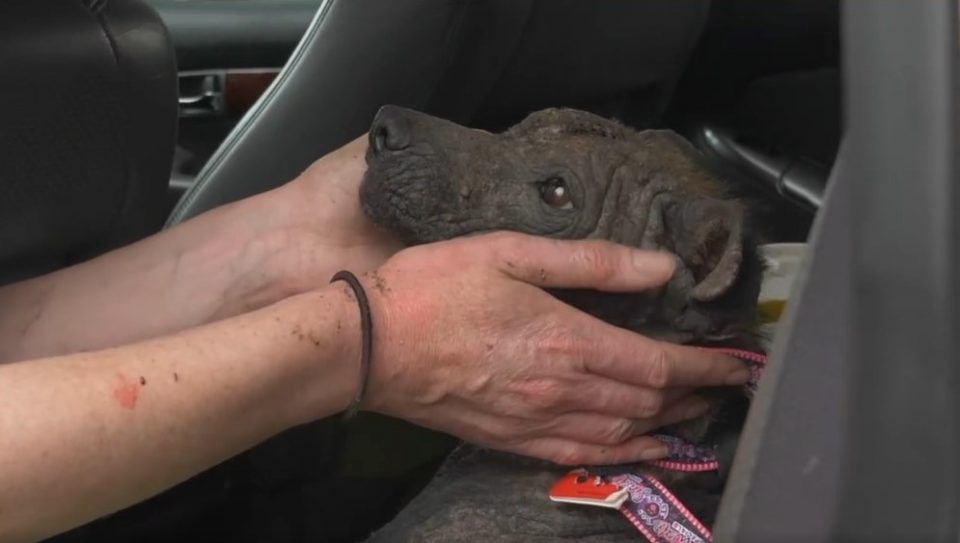
After they secured the pup with a leash, Rachael took him in her arms and carried him to the car. She held his face in her hands while Crumb was looking at her with sad eyes.
It was the first time that someone touched him in years.
Crumb finally started receiving the love that he needed all along.
“We started feeding him and giving him love. His tail started wagging within about 3 minutes,” Rachael told The Dodo.
The rescuers placed him in a crate, and Crumb’s eyes started twinkling. He began realizing that his life was about to change.
His heroes took him to the vet, where he received a complete examination.
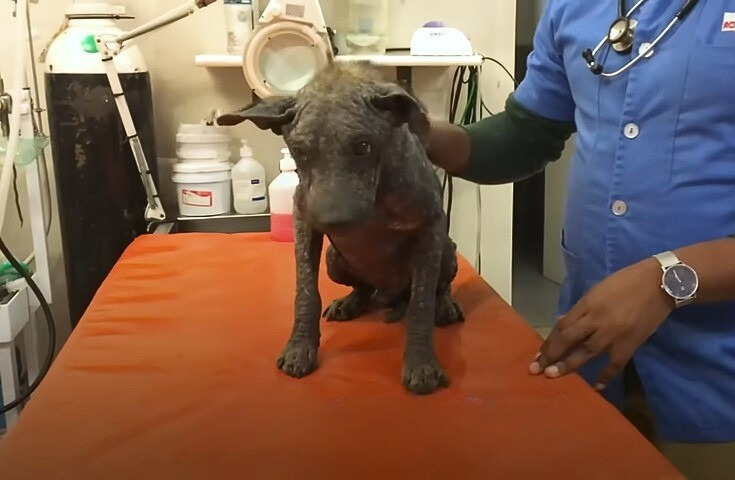
Crumb’s mange went untreated for so long that he looked like he was made of stone. The pooch only had some fur along his spine.
He was also diagnosed with TVT cancer. He needed months of chemotherapy, but luckily, he was going to be alright.
The Pup Realizes That Humans Can Be Kind
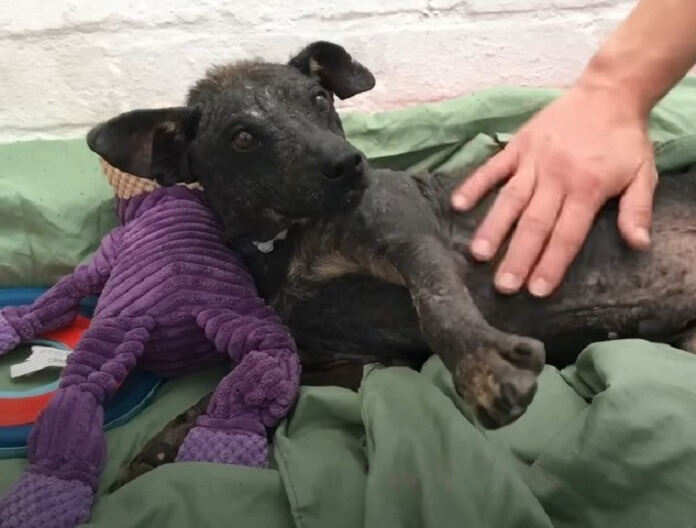
After he was prescribed medicine and medicated baths, Crumb was ready to move in with his foster family and start healing.
His fosters gave him immense love and showered him with encouraging words.
They worked with him every day, pampering him with care and making him feel safe. Crumb realized that good humans do exist and he began trusting them.
His foster family drove him to the vet every week for another medicated bath.
They often took Crumb to the beach. The pup enjoyed sunbathing. He realized that life could be beautiful.
Crumb’s foster family fell in love with him, but they couldn’t keep him because they had to move.
The little pooch started looking for a new home, hoping that he would find someone who would love him for who he was.
Crumb Finds Unconditional Love
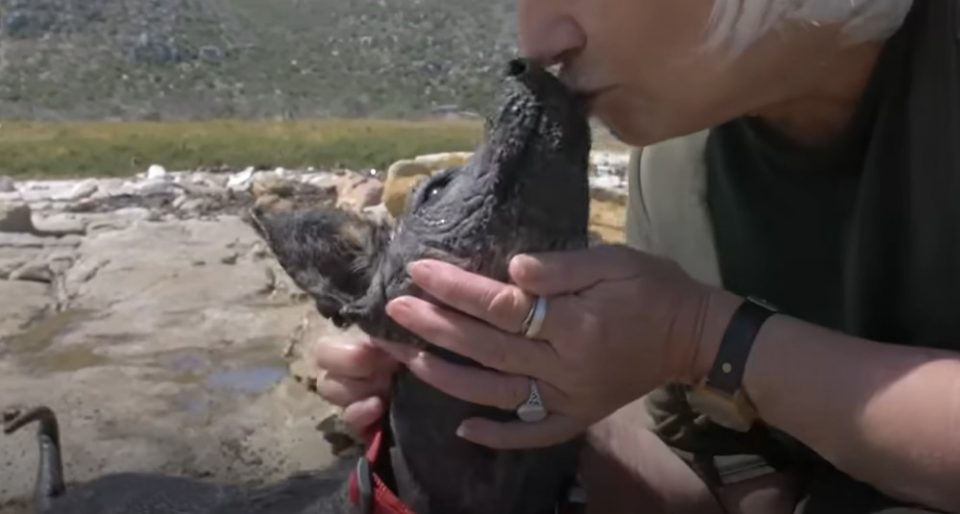
His wish came true. A great family applied for his adoption, and his new mom came to meet Crumb on the beach.
She kissed him and took him to his forever home.
Crumb was happy to start a new life with this family who loved him and considered him perfect.
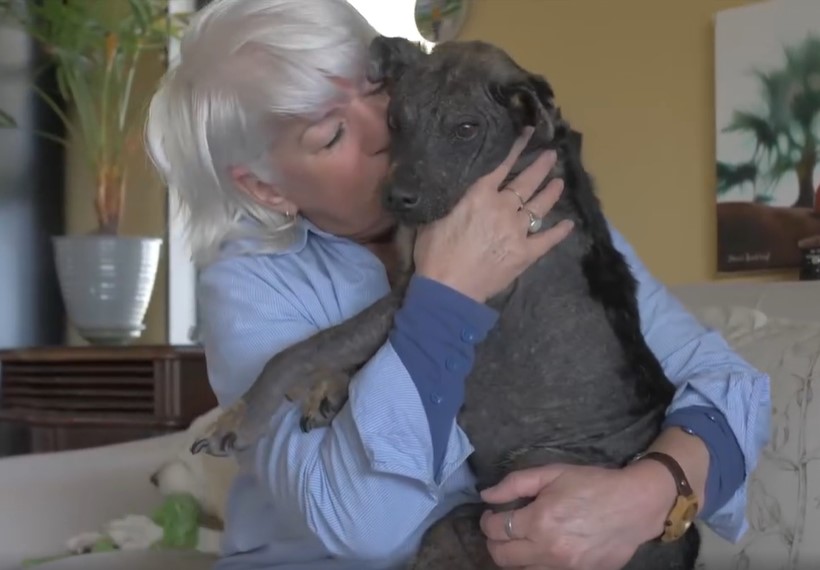
Although he didn’t know how to cuddle at first, he soon turned into a real love bug. Now, he loves to curl up on his mom’s lap.
Thanks to the infinite love his family showered him with, Crumb became a confident boi.
“I think he thinks he’s the man. He’s now got his trot, like, ‘Look at me, guys! I’m not a dump dog anymore,’” Crumb’s mom told The Dodo.
Crumb feels over the moon, and he can’t stop smiling.
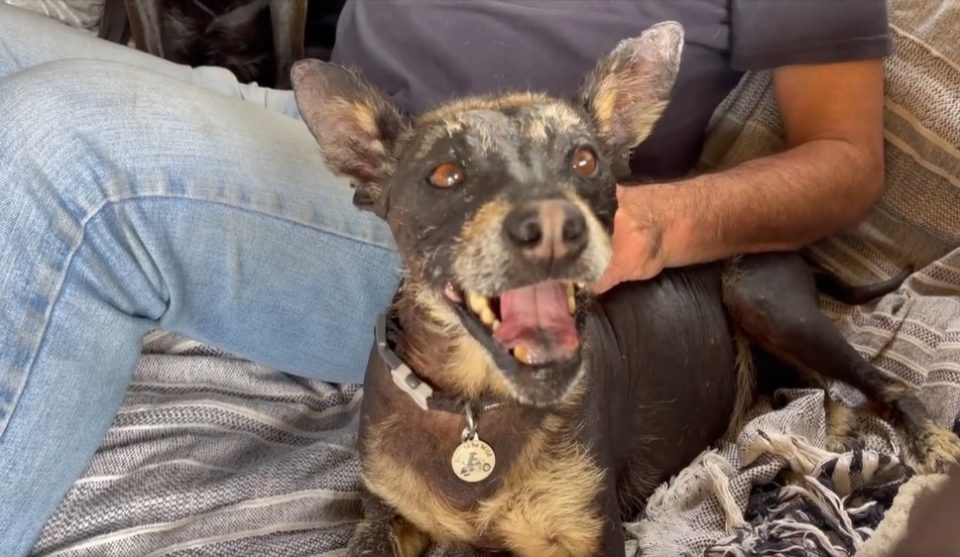
He also has two doggy siblings who adore him. The three pups love playing with each other.
We’re ecstatic that Crumb discovered true love and got his happily ever after.
Huge thanks to the pup’s rescuers for saving him and to all good humans who helped Crumb overcome his fears and become a happy dog.
If you’ve noticed your furry friend experiencing tummy troubles, you’re not alone. Dog diarrhea can be a messy and concerning issue for pet parents. From dietary indiscretions to underlying health conditions, there are various reasons why your pup might be dealing with loose stools. Understanding the potential causes can help you navigate this unpleasant situation with your canine companion.
As a seasoned dog enthusiast, you know that changes in your dog’s stool can be a red flag for their well-being. While the occasional bout of diarrhea is common, persistent or severe cases may require closer attention. In this article, we’ll shed light on some common culprits behind your dog’s upset stomach, offering insights to help you support your four-legged friend’s digestive health.
Understanding Canine Diarrhoea
The Digestive System of Dogs
To comprehend why your furry friend is experiencing diarrhoea, it’s essential to understand their digestive system. Dogs have a shorter digestive tract than humans, aiding in the quick digestion of food. However, this also means that any sudden change in diet or ingestion of inappropriate items can lead to digestive issues like diarrhoea.
Signs and Symptoms of Diarrhoea in Dogs
Recognizing the signs of diarrhoea in your dog is crucial for prompt intervention. Watch out for loose or watery stool, increased frequency of bowel movements, straining to defecate, and blood in the stool. Additionally, vomiting, lethargy, and loss of appetite are common accompanying symptoms that signal a potential health concern for your canine companion.
Remember, understanding your dog’s digestive system and being aware of the signs of diarrhoea are key steps in managing your pet’s health effectively. Regular monitoring and quick action can help alleviate discomfort and ensure your furry friend stays happy and healthy.
Common Causes of Diarrhoea in Dogs
Dietary Indiscretions
When your dog rummages through the trash or eats something they shouldn’t, like human food, it can upset their stomach and lead to diarrhea. Dogs have sensitive digestive systems that can react poorly to sudden changes in their diet.
Infections and Parasites
Just like humans, dogs can get infections and parasites that cause diarrhea. Bacterial infections from spoiled food or parasites like worms can wreak havoc on your dog’s gastrointestinal tract, leading to loose stools and discomfort.
Chronic Diseases and Conditions
Certain chronic diseases such as inflammatory bowel disease or pancreatic issues can also result in diarrhea in dogs. These conditions affect the way your dog’s body processes food and absorbs nutrients, often causing digestive upset.
Stress and Anxiety
Believe it or not, stress and anxiety can play a significant role in your dog’s digestive health. Dogs can experience tummy troubles when they are anxious or stressed, leading to episodes of diarrhea. It’s essential to create a calm and comfortable environment for your furry friend to help alleviate their stress.
When to Visit the Vet
Recognizing the Severity of Diarrhoea
If your dog’s diarrhea persists for more than a day or is accompanied by other concerning symptoms like lethargy, vomiting, or dehydration, it’s time to schedule a visit to the vet. Severe diarrhea could indicate underlying health issues that require professional attention.
What to Expect During the Consultation
During your vet visit, you can expect a thorough physical examination of your dog. The vet may ask questions about your dog’s diet, recent changes, and any potential exposure to toxins. Additionally, be prepared to provide a stool sample for analysis. Based on the examination and test results, the vet will determine the cause of the diarrhea and recommend appropriate treatment.
Managing Diarrhoea at Home
Dietary Management and Hydration
When your dog has diarrhoea, focus on providing a bland diet to help soothe their digestive system. You can try feeding them boiled chicken and rice, which are gentle on the stomach. Make sure to offer small, frequent meals throughout the day to prevent further upset. Additionally, ensure your dog has access to clean water at all times to stay hydrated. Proper hydration is crucial in supporting your dog’s recovery from diarrhoea.
Probiotics and Supplements
Consider incorporating probiotics into your dog’s diet to restore the balance of good bacteria in their gut. Probiotics can aid in digestion and strengthen the immune system. You can find canine-specific probiotic supplements at pet stores or consult your vet for recommendations. Adding supplements like slippery elm or digestive enzymes may also help improve your dog’s gastrointestinal health and alleviate symptoms of diarrhoea.
Home Remedies and Care Tips
To provide comfort to your furry friend, create a quiet and stress-free environment at home. Stress can exacerbate digestive issues in dogs, so ensure they have a calm space to relax. You can use a heating pad on a low setting to help soothe your dog’s stomach discomfort. Avoid giving over-the-counter medications without consulting your vet, as they may not be safe for your dog. Monitoring your dog’s progress and being attentive to any changes in their condition are vital in managing diarrhoea at home.
Preventing Future Episodes
Proper Diet and Routine
Maintaining a proper diet and routine for your furry companion is essential in preventing future episodes of diarrhea. Ensure you feed them a well-balanced diet that is suited to their specific needs and avoid giving them table scraps or foods that may upset their stomach. Establish a regular feeding schedule to help regulate your dog’s digestive system and consider portion control to prevent overeating, which can lead to digestive issues. Additionally, incorporate high-quality pet food that is rich in fiber and easy to digest, promoting a healthy gut and reducing the risk of diarrhea.
Regular Parasite Prevention
Regular parasite prevention is key to safeguarding your dog against diarrhea-causing parasites. Schedule routine check-ups with your veterinarian to ensure your dog is up to date on parasite preventatives such as deworming medications and flea and tick control. Implement a parasite prevention plan recommended by your vet that aligns with your dog’s lifestyle and environmental exposure. By proactively protecting your dog from parasites, you can significantly reduce the risk of diarrhea and other gastrointestinal issues.
Stress Reduction Strategies
Implementing stress reduction strategies can help minimize the likelihood of stress-induced diarrhea in your dog. Create a calm and comfortable environment for your pet, providing them with a safe space where they can relax and unwind. Engage in regular exercise and playtime to help alleviate stress and promote mental well-being. Establish a routine that offers stability and predictability for your dog, helping them feel secure and at ease. By reducing stressors in your dog’s daily life, you can effectively lower the chances of stress-related diarrhea occurrences.
Conclusion
So, there you have it – a comprehensive look into why your furry friend might be experiencing diarrhea. Remember, keeping an eye on their stool, understanding their digestive system, and being aware of common causes like dietary slip-ups, infections, or stress is key. Quick action and a calm environment can make a big difference in managing their health. If the tummy troubles persist, don’t hesitate to seek advice from your vet. By taking steps like adjusting their diet, ensuring hydration, and reducing stress, you can help prevent future episodes of diarrhea. Your pup’s well-being is a top priority, so stay informed and proactive in caring for them.
Frequently Asked Questions
1. Why is it important to monitor changes in a dog’s stool?
Monitoring changes in a dog’s stool is crucial as it can indicate their well-being. Signs like loose stool, increased bowel movements, or blood in the stool may signal health issues.
2. What are the common causes of diarrhea in dogs?
Common causes include dietary indiscretions like eating human food, infections, parasites, chronic diseases such as inflammatory bowel disease, and stress and anxiety affecting digestive health.
3. When should I visit the vet for my dog’s diarrhea?
Visit the vet if your dog has persistent diarrhea lasting over a day or shows concerning symptoms like lethargy, vomiting, or dehydration.
4. What should I expect during a vet consultation for my dog’s diarrhea?
A vet consultation typically involves a physical examination, questions about the dog’s diet and recent changes, and possibly a stool sample analysis to determine the cause and recommend suitable treatment.
5. How can I manage my dog’s diarrhea at home?
You can manage diarrhea at home by focusing on dietary management with a bland diet, ensuring hydration, incorporating probiotics, offering a stress-free environment, using a heating pad for comfort, and closely monitoring your dog’s progress.
6. How can I prevent future instances of diarrhea in my dog?
Prevent future episodes by maintaining a proper diet and routine, regular parasite prevention, and implementing stress reduction strategies to minimize stress-induced diarrhea in dogs.
[no_toc]

Hey there, I’m Janet Brooks, a dog-loving student from California. I’m all about helping pups in need, especially those without homes. Me and my awesome friends work together to give shelter and love to stray dogs. Oh, and I also write blogs about dogs to share helpful info.